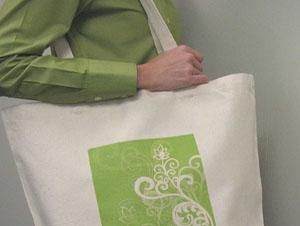Smart ways to go green this Earth Day
(Image: Canton Public Library (MI), Creative Commons)
The following is not a full transcript; for full story, listen to audio.
Today is Earth Day, and many of us are patting ourselves on the back for going green. But despite your wise decisions to buy CFL light bulbs, zero VOC paint and phosphate-free soap, it turns out most products that advertise themselves as green are barely scratching the surface. But there’s good news! Advances in new sciences like industrial ecology mean we are on our way to a greener future.
On "The Takeaway" to explain what that all means and what small steps you can really take: Daniel Goleman, author of "Ecological Intelligence: How Knowing the Hidden Impacts of What We Buy Can Change Everything."
Goleman: "Being green was a good first step, but it’s really a baby step. What’s different this Earth Day is that we can change the focus from what we do — do you take a bike, do you drive a car — to the things we buy. Because actually, most of the problems on the planet are driven by a huge industrial machine that’s cranking out pollutants … it’s putting chemicals into our rivers, into our bodies, that create disease. It’s doing many, many things, and you know who’s driving it? Us. But until today, we have never had access to the information that would help us do anything … about it, now we can be very smart.
"There’s a new discipline — it’s an academic discipline called industrial ecology — it’s a group of industrial engineers, chemists, physicists and so on, who are getting very precise metrics about the entire life story of any product. So they can tell you from the point of extraction materials … manufacture … transport, time in store, your use, disposal — they can give you metrics that are extraordinarily exact for how much at this point, in this step, you’re putting pollutants into the environment, you’re creating disabilities in people down the road, they have amazing metrics.
"For example, if you make a glass bottle, there are 1,959 distinct steps that these folks analyze; each one has a full spectrum of impact, and now all of that information is available to you and to me at the store as we’re about to buy the stuff."
Goleman says databases like Good Guide and Skin Deep can help consumers quickly process all this information and choose products that are green and healthy.
"The Takeaway" is a national morning news program, delivering the news and analysis you need to catch up, start your day, and prepare for what’s ahead. The show is a co-production of WNYC and PRI, in editorial collaboration with the BBC, The New York Times Radio, and WGBH.
Every day, reporters and producers at The World are hard at work bringing you human-centered news from across the globe. But we can’t do it without you. We need your support to ensure we can continue this work for another year.
Make a gift today, and you’ll help us unlock a matching gift of $67,000!
